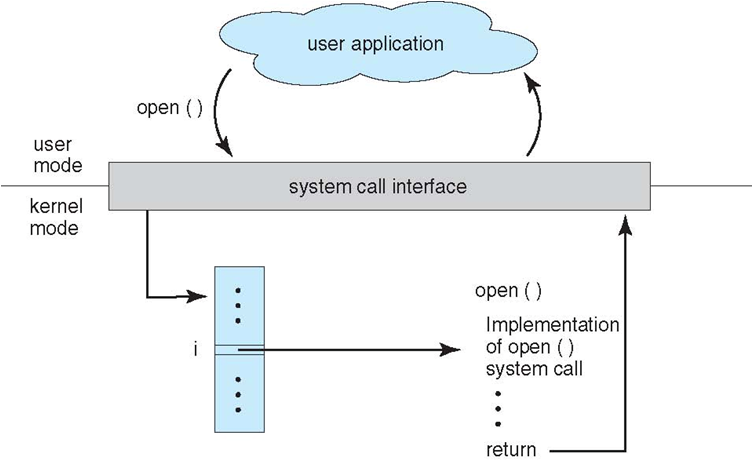Lecture 3
System Calls
Lecture
Outline:
System Call Types
There are several types of system calls. Each type solves a specific kind of task:
- Process control
- creating and terminating processes
- loading and executing programs
- getting and setting process attributes
- allocating and freeing memory
- waiting and signaling events
- File management
- creating and deleting files
- opening and closing files
- reading, writing, repositioning
- getting and setting file attributes
- Device management
- requesting and releasing devices
- reading, writing, repositioning
- getting and setting device attributes
- attaching and detaching devices
- Information maintenance
- getting and setting date/time
- getting and setting system data
- getting and setting process, file, or device attributes
- Communications
- create and delete communication connection
- send and receive messages
- transfer status information
- attach and detach remote devices
- Protection
- getting file permissions
- setting file permissions
These tasks will be discussed in upcoming lectures and workshops.
Workshop
Outline
- General idea of system calls
- System calls
open,close,read, andwrite - System call
sbrk - System calls in C
Theory
System calls are operations (functions) provided by the operating system kernel, which are available to user applications. They are designed and documented by operating system kernel developers. System calls are typically executed with the help of so-called wrapper functions, which can be conveniently used in user-mode applications (e.g. the glibc library in Linux). System calls allow executing kernel tasks upon user’s requests. Modern operating systems isolate kernel memory from user applications. Therefore, when a user application needs to make a request to the kernel (open a file, create a process, send data to network, etc.), a switch between kernel and user modes is required. This makes system calls much slower than regular function calls. System calls are made in architecture-dependent way, employing specific features of the instruction set architecture. A basic solution for system calls is employing the processor interrupt feature. However, a processor can also provide special instructions for this job. Arguments are passed via registers if they are available, extra arguments are passed via stack. The operating system kernel saves and restores execution state (e.g. registers) when switching between the use and the kernel modes.

System calls in Linux API (C language)
Linux provides the following facilities to execute system calls:
-
POSIX functions that are mapped directly to Linux system calls. For example,
open(),read(),write(), etc. -
glibc functions which are operating-system independent wrappers around system calls. For example,
fopen(),scanf(),printf(), etc. -
syscall()- special glibc function to perform an indirect system call by number.
API-functions that perform system calls
Functions that are called in user program to execute system calls are defined in special header files. To make them available, a corresponding header must be included into the program source code and then a function can be called.
- The “open” function from POSIX:
#include <sys/stat.h>
#include <fcntl.h>
int open(const char *path, int oflag, ...);
- The
fopenfunction from glibc:
#include <stdio.h>
FILE *fopen(const char *pathname, const char *mode);
- The “syscall” function:
#include <unistd.h>
#include <sys/syscall.h> /* For SYS_xxx definitions */
long syscall(long number, ...);
In Ubuntu 20.04 LTS, more system call declarations can be found in the following file:
/usr/src/linux-headers-5.4.0-53/include/linux/syscalls.h.
Examples
- hello1.c - using the
printfglibc function - hello2.c - using the
writePOSIX function - hello3.c - using the
syscallfunction
All the three examples, do the same: they print the “Hello World” message to the console. To compile and run them, the following commands need to be executed:
gcc hello1.c –o hello
./hello
System calls in C:
-
Read documentation on the read and write system calls. Note descriptors standard numbers for
stdin,stdout, andstderr. Write a program that reads chars (note the&cnotation) fromstdin, increments them by 1, and writes them tostdout. Do not forget to include all the headers mentioned in the manual. To closestdinfrom the terminal, use the^Dkey combination (it is not passed to program, but interpreted by operating system as end of output). -
Read documentation on the open system call. Take notice of flags, which are used to indicate how the file is opened. Flags are bits and can be combined with bitwise OR (
|). TheO_RDONLYflag is used to open a file for reading. TheO_WRONLY|O_CREAT|O_TRUNCcombination is used for open a file for writing. The mode parameter is required when creating the file. It specifies file access rights. For example, theS_IRUSRflag means that user has read permission, theS_IRGRPmeans that group has read permission, theS_IROTHflag means others have read permission. Write a program that reads 100 words fromstdinand writes them to a file named outfile. Do not forget to close the file. -
Modify the previous program to accept command-line arguments (argc/argv). Pass via command-line arguments the number of words (use sscanf to get an integer from argv[1] and the name of output file (argv[2]).
Homework
TODO
References
- System call (Wikipedia)
- System call open (Wikipedia)
- System call close (Wikipedia)
- System call read (Wikipedia)
- System call write (Wikipedia)
- System call sbrk (Wikipedia)
- The GNU C Library (glibc)
- POSIX (Wikipedia)
- C POSIX library (Wikipedia)